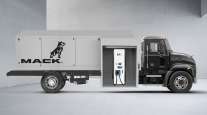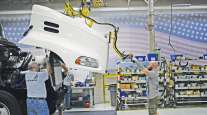Meet the Straight-Faced Swede Helping Transform Mack's Pennsylvania Plant

Rickard Lundberg started his career in the Volvo Group in 1989 when he was only about 19 years old. Then, in the first of what would be many jobs with Volvo, he worked on the shop floor, turning crankshafts at the truck maker's engine factory in Skovde, Sweden.
So perhaps it shouldn't come as much of a surprise that Lundberg, now 47, brings that same hands-on approach to his new job as the vice president and general manager of Mack Trucks' Lehigh Valley, Pa., operations.
In fact, when Lundberg arrives at the massive Lower Macungie Township assembly plant — a little before 7 a.m. most days — he typically spends the next three hours on the shop floor, preferring to interact with some of the plant's 1,500 employees and understand issues firsthand rather than dissecting the facility's processes within the confines of a boardroom.
"I'm born on the shop floor," said Lundberg, who started at Mack on Oct. 1 after a roughly three-year stint as vice president for powertrain production at a Volvo plant in Koping, Sweden. "That's where I started my career in this company many, many years ago, and that's where I hope to die sometime, I think — out there together with people."
Now Lundberg — who built scale models of Mack trucks as a 10-year-old boy in Sweden — has the responsibility to ensure the Lower Macungie plant is properly reborn through an $84 million investment that aims to turn the structure into a world-class facility. That investment is slated for completion around mid-2018 and will make the 1-million-square-foot facility more modern, integrated and efficient.
Lundberg, who doesn't smile for photos but maintains a sense of humor, spoke to The Morning Call earlier this month about the investment project, his career with Volvo and the possibility of getting a tattoo of the iconic Mack bulldog.
Here are excerpts from the interview:
Q. Why did you want to take this job at Mack?
A. When my manager at the time called me and said there is a position for you if you would like to go there, I took the decision like that [snaps his fingers]. There are many things to it. The first one is of course the brand, Mack. It's easy to fall in love with the brand. I spent time in Volvo for 28 years before coming here, and I never thought about getting a Volvo tattoo, but I'm actually thinking about a bulldog up here [points to his arm]. I kind of promised during my first town hall that there might be a bulldog on my arm. There are 1,500 people that can hold me accountable for that.
It's a childhood dream for me to be part of what we are doing here. I built Mack trucks long before I joined Volvo. As a 10-year-old boy, I built scale models. My friends, they built motorcycles and cars. But I built scale models of trucks, and it wasn't Volvo or Mercedes — what you see in Europe. It was American trucks. There were some Peterbilts there, yes, but there were Mack trucks and Freightliners. American trucks have been there for me for a long, long time.
Q. How are you transitioning to the area on a personal level?
A. Very well. We enjoy the area, both me and my family. I moved here with pieces of my family. I have four kids and two of them are adults — one of them right now is at a university in Sweden and other one is traveling around the world. My wife and two small kids — 5 and 7 years old — relocated here with me in November, and we live in Upper Macungie.
On a typical weekend, we don't leave Upper Macungie because we like it. We found a wonderful house, and we have a nice park just outside where we are living, where we take the kids and they can play. The soccer season started and both of them are active on soccer teams. We're really enjoying the area right here. The kids are in school — the big one in second grade and the small one in preschool activities, and my wife started working 1 1/2 months ago. We settled down really nicely.
Q. Mack recently recalled 100 people back to work at the plant, and you're hiring another 50. Where do you see employment headed at this plant?
A. There are two things that decide the employment. One is the market situation, and we will constantly try to adapt to the market. So if the market is showing we're going up, then we will hire people. If we go the other way, we will have other kinds of discussions. Right now, we hired 100 people, we added a second shift for one of our assembly lines and that is to follow where the market is going. And the other thing that will determine the number of people we have is the different ambitions we have at that moment. You said 150 — it's 100 related to the second shift we are putting in place, and the other 50 is connected to our ambitions right now to increase the quality level and to increase our ability to deliver trucks on time to our customers.
Q. It seemed, by the summer of 2015, the relationship between Mack and the community might have atrophied a bit. When you got here, what did you see?
A. I think you're probably painting a quite accurate picture. Looking into what my predecessor did and maybe some people before that, they wanted to really come back to a situation where people were aware of, "Hey, the headquarters moved in 2009, but we are still here." There's a big chunk of people in the plant — 1,500 people. We are still here. We are still producing all the trucks for the North American market in this place, and we are planning to stay. That's why we are investing $84 million because we are planning to stay in this facility.
Q. How's everything going here at the plant with the upgrades, and what is Mack trying to achieve with the expansion?
A. We are right in the middle of what we call Reborn. That's the branding name of the whole rebuilding of the plant — creating new infrastructure, how we bring material into the plant, how we can take care of the assembly operation within the plant and how we bring trucks out of the plant. When I joined here, it was more or less set up: This is what we're going to do. So for me, it's very much now that we make sure we do it in the best possible way.
I would like to put a lot of emphasis on it's a clear aim to become a world-class facility. This facility was built in 1975 and not much was done over a number of years and now we're trying to do everything at one time. We also need to put much effort into the soft part of the change. Investments by themselves will not make us world-class. It's how we interact and engage people, how we work with people and processes, how we take care of the engaged men that we have on the shop floor.
Distributed by Tribune Content Agency, LLC




